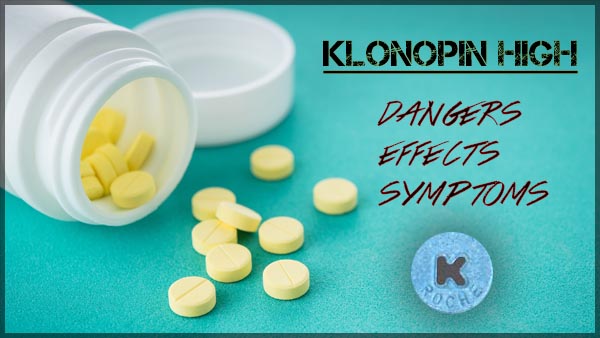Klonopin, the brand name for the drug clonazepam, is a medication used to treat panic disorder, seizures, and akathisia. It causes a depressant effect, which can be very appealing to those who are at risk for addiction.
Although medical professionals prescribe Klonopin for a variety of reasons, it’s highly addictive.
It has been considered one of the most addictive prescription drugs available. Even those individuals to whom it’s prescribed are at risk.
Is Klonopin the new drug to look out for? Are people getting hooked on the Klonopin high? Read on to find out about the dangers, effects, and symptoms of this prescription drug.
Addiction: Crossing the Line
When someone takes any psychiatric medication, they will likely form a dependence over time. This is normal, and the doctor will be aware of this process.
The individual may begin taking unprescribed doses to cope with difficult situations. This is where use starts to transform into abuse.
They will quickly build a high tolerance and may begin taking more.
When the presence of clonazepam in the body drops, the individual will focus on acquiring and ingesting more. The body will start to require the medication to function.
The patient may start doctor shopping in order to get multiple prescriptions.
Individuals may be able to find the drug at parties or from friends without a prescription.
These situations are especially dangerous. Individuals run the risk of taking uncertain medications and doses.
Klonopin High Signs and Symptoms
If you’re concerned that someone you know has been abusing clonazepam, there are certain warning signs to look out for.
The signs and symptoms may progress over time with increased use.
You may notice these signs:
- lack of coordination
- dizziness
- drowsiness
- problems with memory
- seizures
- shallow breathing
Other signs and symptoms may be more difficult to notice in someone else, such as stomach upset, psychosis, depression, or constipation.
Someone who is struggling with an addiction may begin neglecting responsibilities. If you’re dealing with a younger person, look for a decline in academic performance.
They may also begin stealing or borrowing money to pay for the drug.
Long-Term Effects of Use
Long-term use of clonazepam is not recommended. It’s known to be a habit-forming medication.
Users will suffer from withdrawal symptoms if they suddenly stop taking the drug or cannot get access to it.
They may experience the symptoms they were treating with the medication. These may include hallucinations, seizures, insomnia, and anxiety.
Seeking Treatment and Rehabilitation
If you notice a loved one struggling with an addiction, it’s important that you reach out and help them.
They may need to enter a rehabilitation program that specializes in benzodiazepines.
The withdrawal symptoms can be dangerous and need to be monitored by a medical professional. Do not try to deal with the problem on your own.
A cold turkey approach could potentially be fatal.
The individual will need to go through a detoxification process to wean the body off the drug.
If you’re worried about how they may respond to your concern, you may need to stage an intervention. With the help of an intervention specialist, you and a group of close friends and family will confront the problem.
This is a delicate process and should be carefully thought out.
As part of the rehabilitation process, other drugs may be used to mitigate withdrawal symptoms. Klonopin may be replaced with other long-acting sedatives to treat any lingering symptoms.
They will likely need to attend an aftercare program following the initial rehabilitation program. These outpatient programs allow a patient to return to their normal lives while still receiving treatment.
The road to recovery can be long and painful. It’s important that you support a loved one if they’re struggling.
Risk of Overdose
An addict will continually take more of the medication in order to achieve the same high.
They will be at risk for an overdose, which could potentially be fatal. If you’re worried a loved one is overdosing on Klonopin, get medical help immediately. Take them to the emergency room.
It’s better to be safe than sorry.
Signs to look for include the following:
- extreme drowsiness
- slow reflexes
- fainting and loss of consciousness
- coma
- difficult movements
- lack of coordination
- confusion
- disorientation
Responsible Use
If you’ve been prescribed Klonopin, it’s important that you use the medication responsibly. Take only the prescribed dose.
Talk to your doctor about any previous addictions or mental health problems. It’s important that your doctor know if you’re at risk for addiction.
Even those patients who have no addiction history are at risk.
Take note of how the medication makes you feel and whether or not you experience any negative side effects.
Keep all your appointments with your physician. Talk and make sure the medication is working for you. Speak with your physician if you notice any of the signs and symptoms mentioned above.
Seek medical attention immediately if you experience a painful rash, hives, swelling of the face and throat, or difficulty breathing.
Mitigating Risk and Seeking Help
Although a medication is prescribed by doctors, it can still produce harmful effects. Sedatives like clonazepam can have potentially fatal effects when abused.
If you’ve been prescribed clonazepam for any reason, it’s important that you use it responsibly.
The Klonopin high can ruin lives.
If you notice a loved one struggling with an addiction, seek help. If you need, stage an intervention and confront the problem.
Revive Detox offers a range of drug treatment programs, from detoxification to outpatient care. If you have any questions about our programs, reach out to us.
You are not alone. If you need help, seek it.





